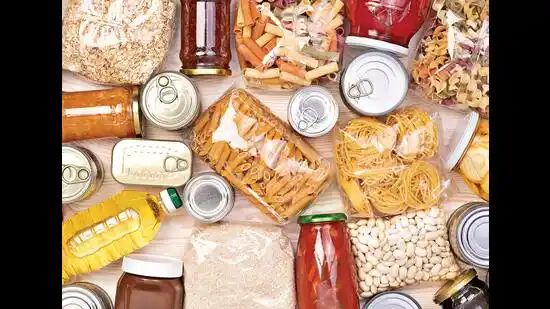Rude Food by Vir Sanghvi: The real problem with processed food
Well, it turns out that she was right. But she was also wrong. Restaurant food is not necessarily unhealthy. A good restaurant that uses fresh, natural ingredients can actually give you a healthier meal than you may have at home.
What our grandmothers did not take into account is that the food ingredients you use to cook with at home may actually be much worse for you than restaurant cuisine.
There was a time when we only bought sabzis from our local sabziwala. Meat came from a butcher in the neighbourhood. And there was a local shop where we bought our masalas from. Almost all of this was generally healthy and good for us.
But times have changed. For a start, many of us now shop on the internet. So we have no real idea where the vegetables we order have come from. Likewise, with the meat which comes in fancy packaging, but which we know so little about. Because the world has got more international, we also buy ready-made pasta sauces or Chinese sauces to liven up our cooking. Even cooked food is improved by a huge range of sauces and condiments.
Our eating habits have changed to incorporate more Western ingredients: It is more sophisticated to send your child to school with a sandwich in his or her lunchbox than with, say, sabzi and a paratha.
There is nothing wrong in cooking food that is more international or even with ordering your provisions on the internet. But never forget that, bit by bit, we are losing control over information regarding the provenance and full composition of ingredients.
If you order meat products, say sausages or burger patties, always remember that they probably come from factories and you may not want to hear how they were made. So it is with nearly all bread that is not made by an artisanal bakery. As for readymade pasta or cheese sauces, they are almost certainly industrial. And we haven’t even got around to discussing ready meals, frozen pizza bases, etc.
To be fair, this is not as much of a problem for us in India as it is in the West. But there is no doubt that we are swiftly heading in that direction.
There is a basic – and fairly obvious – problem with all food that is made in large quantities, whether it is a loaf of bread or a hot sauce. For products like these to travel from a factory to a shop (or to your home if you have them delivered), the manufacturer has to pump them full of chemicals that let them stay fresh (ie. not spoil) and help them keep their shape during the journey.
There is a second problem. Because internet shopping allows you to compare prices much more easily than, say, local grocer’s shops, there is a huge competitive advantage for manufacturers who can keep prices low. This usually means that they have to tinker with the recipe (or the formula) to reduce the dependence on expensive ingredients. Or they just use cheaper versions of the original ingredients.
To make up for the relative lack of flavour in items made with cheaper ingredients or with low-cost recipes, manufacturers turn to chemicals – what they call flavouring agents – to add some oomph to the taste.
This means that the food products you buy today are likely to be more chemical and more processed than ever before. All of us know, intuitively, that this can’t be a good thing. But is it actually bad for our health?
Over the last decade (and especially over the last five years) a global movement has developed to discourage people from eating what are called Ultra Processed Foods (UPFs). Like all such movements , the initial rhetoric has often been overblown.
Nor have the opponents of UPFs been able to convincingly explain why anyone who eats, say, a Bourbon biscuit, is placing his or her life in danger. Therefore while I have always respected some of the arguments of the anti-UPF campaign, I have been sceptical of their overly scary sloganeering.
Even so, the movement has been remarkably effective. It is hurting the big food companies and in the US, it has severely damaged the growth potential of so-called plant-based meat which is the ultimate Ultra Processed Food.
In the UK, a committee of the House of Lords was shocked to discover last week that UPFs make up 55% of the typical British diet; one reason for the UK’s obesity problem. The Committee was told that industrially produced foods contained chemicals which while not poisonous, certainly have damaging effects on health.
This has coincided with the publication of a study in the British Medical Journal which concluded that UPFs were linked to 32 conditions including diabetes, cancer, heart disease and depression.
The problem with all such research is that it is usually based on observational studies. These are studies where you compare the health of people who consume many UPFs with people who don’t.
You can always make a counter-claim about such research and say that UPFs are not the real villain. People who don’t eat packaged foods tend to be more health conscious anyway (and richer so they can afford fresh fruit and vegetables and be better nourished).
The reason why people who eat more UPFs have a greater incidence of poor health conditions could be because they are not particularly health-conscious anyway: they eat junk food (usually characterised by a combination of fat, sugar, salt and carbohydrates) and don’t bother too much with exercise.
Scientists still have not been able to convincingly explain the biology: how exactly do UPFs lead to poor health consequences? One theory, gaining popularity, is that the chemicals in processed food have an effect on the microbes in our gut. This may or may not be accurate but the truth is that we still don’t know enough about how exactly the bacteria in our gut affect our overall health to make convincing links to UPFs.
Nevertheless, it is fair to say that anyone who eats packaged food is consuming more chemicals than is immediately apparent. Many packaged foods contain artificial flavours. In America, flavour chemicals are even added to butter to make it taste more like butter. According to the bestselling book The Dorito Effect, there are added flavours in ready-to-cook burgers, frozen pizza, oatmeal, coconut cream pie, French fries, Earl Grey tea, pasta sauces, canned soups, steak sauces, breakfast cereals, canned tuna, ice-cream, chocolate chip cookies and many other products.
The chemicals are rarely identified on the packaging and even when the term natural flavours is used, it only means that the flavour was extracted from a non-petrochemical source. For instance, vanillin, which is usually passed off as the more expensive and complex vanilla, can be extracted from pine cones and wood pulp, not from the vanilla orchid. Truffle oil, on the other hand, is often made with molecules that come from petroleum.
Does it matter? Well, even if the effects on health can be disputed, would you be inclined to buy a product if the ingredients were accurately listed as, “hydrolysed corn, soy protein, and autolysed yeast extract, wheat protein, disodium inosinate and guanylate”?
I guess not.
So, what is to be done? Personally I think it is a matter of individual choice. Until there is more evidence, I cannot support a ban on UPFs. But the suggestion that some products should carry a health warning (or maybe just a black star) is worth considering.
Unill then, eat well. But eat naturally. Restaurants are not necessarily the problem. Processed food, on the other hand, should always be approached with caution.






